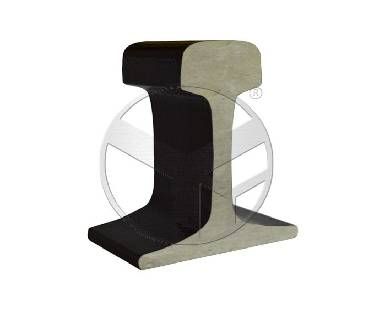Home >> News >> Latest News
The type of Steel Trackis expressed in kilograms per meter of Steel Track mass. There are several kinds of Steel Tracks used on Steel Trackways in my country, such as 75kg/m, 60kg/m, 50kg/m, 43kg/m and 38kg/m.
The cross-sectional shape of the Steel Track adopts an I-shaped cross-section with the best bending resistance, which is composed of three parts: Steel Track head, Steel Track waist and Steel Track bottom. In order to make the Steel Track better withstand the forces from all aspects and ensure the necessary strength conditions, the Steel Track should have sufficient height, its head and bottom should have sufficient area and height, and the waist and bottom should not be too thin.
Among the above various types of Steel Tracks, production of 38kg Steel Tracks has been stopped, 60kg Heavy Steel Railand 50kg Heavy Steel Rail are laid on the main trunk lines, and 43kg Steel Tracks are generally laid on station lines and special lines. For heavy-duty Steel Trackways and particularly busy sections of Steel Trackways, 75kg/m steel Steel Tracks are laid.
In addition, in order to meet the needs of structures such as turnouts, extra-large bridges and seamless tracks, my country's Steel Trackways have also adopted special section (I-shaped asymmetrical to the central axis) Steel Tracks.

60kg Heavy Steel Rail
The standard length of steel Steel Tracks in my country is 12.5m and 25.0m. Extra-heavy Steel Tracks and Heavy Steel Rail use 25.0m standard length Steel Tracks, and other types of Steel Tracks can use 12.5m25.0m standard length Steel Tracks.
The Interim Technical Conditions for 60kg/m Steel Tracks on a 250km/h Passenger Dedicated Line stipulates that the standard Steel Track length of a 250km/h passenger dedicated line (taking into account freight) is 100m. There are three types of curvilinear shortened Steel Tracks that are 40, 80, and 120mm shorter than the 12.5m standard Steel Track, and three types that are 40, 80, and 160mm shorter than the 25.0m standard Steel Track.
(1) The rolled steel Steel Track should be straight without significant bending or twisting. The local bending and torsion of light and heavy Steel Tracks, as well as the amount of corrective deformation, and the inclination of Steel Track end faces, shall not exceed the standard requirements.
(2) The surface of the Steel Track should be clean and smooth, free of defects such as cracks, scars, scratches, etc.; there should be no shrinkage marks and interlayers on the end surface. The allowable defects on the overall surface of the light and heavy Steel Track and the degree of their geometric quantity shall not exceed the standard.

Leave a message